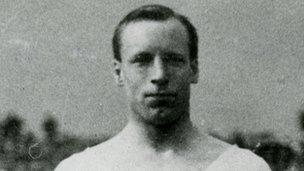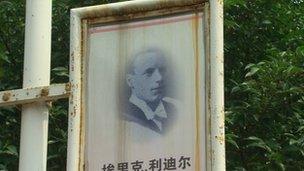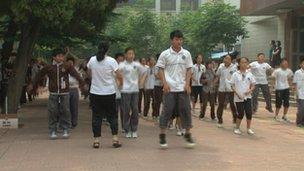Chariots of Fire's Eric Liddell is Chinese 'hero'
- Published
A memorial stone stands in the grounds of the prisoner camp where Liddell died
The story of Scottish athlete Eric Liddell - a devout Christian who refused to take part in an Olympic race because it took place on a Sunday - became famous after being told in the Oscar-winning film Chariots of Fire. But almost a century later, why is the athlete regarded as a hero in China?
In the corner of a quiet Chinese courtyard, 5,000 miles from Scotland, stands a memorial in Isle of Mull granite.
The stone commemorates Eric Liddell - one of Scotland's greatest Olympians - who is buried nearby.
The stone was gifted by Edinburgh University after a Scottish engineer, Charles Walker, rediscovered his grave in the Chinese city of Weifang.

Eric Liddell won a gold medal at the 1924 Olympics in Paris
Liddell, the son of Christian missionaries, had been born in China in 1902 and lived there until he was five when he returned to Britain to be educated.
While he was at Edinburgh University, Liddell excelled at athletics and also played rugby for the Scottish national team - as well as being a noted evangelist preacher.
At the 1924 Olympics in Paris, he famously refused to run on a Sunday, ruling him out of the 100 metres race to which he was best suited.
Instead, he took part in the 400 metres race and, against the odds, still won a gold medal.
Soon after his Olympic triumph, Liddell finished his studies and returned to China to become a missionary.
As well as religious duties, he worked as a science and sports teacher at the Anglo/Chinese College in Tianjin.
After the Japanese invasion in 1937, Liddell carried on his missionary work even when it became dangerous to do so.
Liddell's wife and children left China for Canada in 1941 but he stayed to help in any way he could.
In 1943 he was interned at Weifang and he died of a brain tumour just months before the end of World War II, at the age of 43.

Liddell's achievements are taught at the school on the site of the prison camp
The prisoner-of-war camp which held about 2,000 Westerners is now a place of learning for 2,000 Chinese teenagers.
Every new pupil at the school is taught about the camp and Eric Liddell's achievements on and off the track
"This part of history is a great treasure for our school," said head teacher, Zhao Guixia.
"We can see the great value of humanity, especially in Eric Liddell's stories."
In the camp, Liddell was affectionately known as "Uncle Eric" because he spent most of his time teaching children, organising sports and helping others.
Because he was born in China, some people regard him as the first Chinese Olympic gold medallist.
"It is not a joke," said Wang Hao, Weifang's director of foreign affairs.

The camp where Liddell died is now a school
"We are very proud of Mr Eric Liddell. He is a hero".
A small internment camp museum features Liddell's story but the city has plans to pay a bigger tribute.
The building where he died is to be converted into a new museum with a reconstruction of Liddell's prison room and a waxwork of him inside.
It will be a remarkable honour for a Christian missionary in a Communist country.
Outside China, his greatest monument is the movie he inspired.
Chariots of Fire has been digitally remastered and re-released to cinemas to coincide with London 2012.
Eric Liddell: A Champion's Life will be broadcast on BBC Two Scotland at 2200 BST on Monday 23 July.